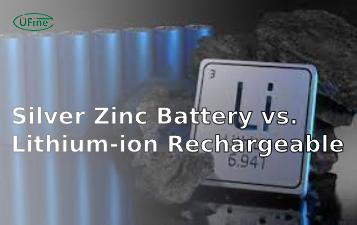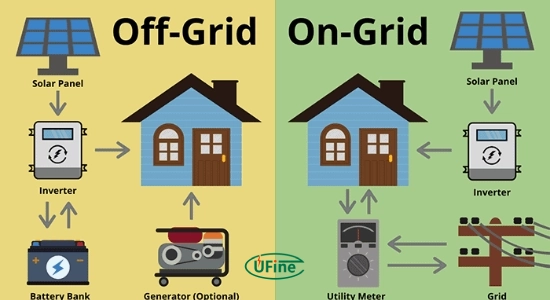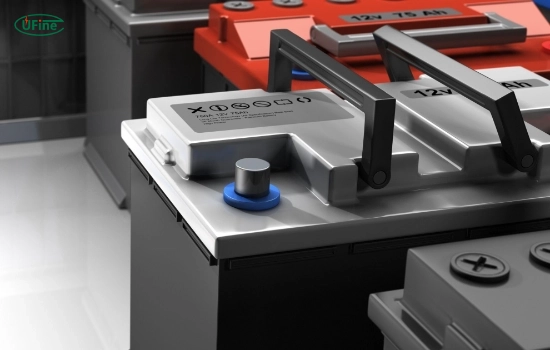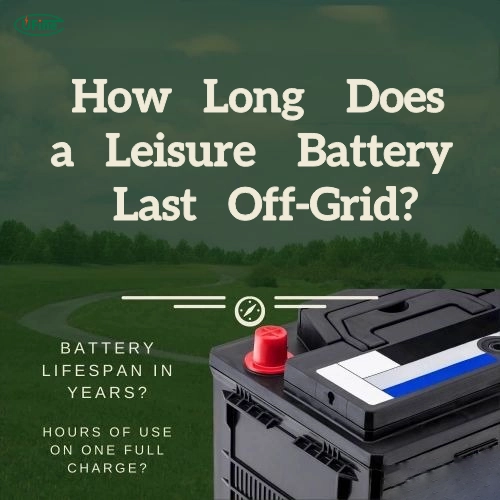
- Part 1. What is off-grid living?
- Part 2. What is a leisure battery?
- Part 3. Types of leisure batteries
- Part 4. Factors affecting leisure battery lifespan
- Part 5. Estimating battery lifespan off-grid and real-world examples
- Part 6. Tips to extend leisure battery lifespan
- Part 7. Common signs of leisure battery degradation
- Part 8. Selecting the correct leisure battery for your needs
- Part 9. FAQs
When venturing off-grid, one of the most pressing concerns is how long a leisure battery lasts off-grid. This question is crucial for campers, van-lifers, and anyone relying on renewable energy sources. This comprehensive guide will delve into the intricacies of leisure batteries, their longevity, and how to maximize their lifespan while enjoying your off-grid adventures.
Part 1. What is off-grid living?
Off-grid living refers to a lifestyle where individuals or communities rely on their resources for power, water, and other essentials rather than connecting to the public utility grid. This often involves using renewable energy sources like solar, wind, or hydropower to generate electricity and employing water collection and waste management systems. The appeal of off-grid living includes independence, sustainability, and often a closer connection to nature.
Part 2. What is a leisure battery?
A leisure battery is a deep-cycle battery designed to provide steady power over an extended period. Unlike car batteries, which deliver a large burst of energy for a short time, leisure batteries withstand prolonged use. People commonly use them in recreational vehicles (RVs), boats, and off-grid setups to power appliances, lights, and other electrical devices.
Part 3. Types of leisure batteries
Understanding the different types of leisure batteries is the first step in determining how long a leisure battery lasts off-grid. Here are the main types:
Lead-acid batteries
Lead-acid batteries are the most common and affordable type of leisure batteries. They are available in two main variants: flooded and sealed. While reliable and cost-effective, they require regular maintenance and have a shorter lifespan than other types.
AGM batteries
Absorbent Glass Mat (AGM) batteries are sealed lead-acid batteries with better performance and a longer lifespan than traditional ones. They are maintenance-free and can handle deeper discharges, making them popular for off-grid enthusiasts.
Gel batteries
Gel batteries are another sealed lead-acid battery that uses a gel electrolyte. They are highly durable, require no maintenance, and have a longer lifespan than flooded lead-acid batteries. However, they are more expensive and can be sensitive to overcharging.
Lithium-ion batteries
Lithium-ion batteries are the most advanced and efficient type of leisure batteries. They offer a significantly longer lifespan, higher energy density, and are much lighter than lead-acid batteries. While they come with a higher price tag, their performance and longevity make them a worthwhile investment for off-grid severe users.
Part 4. Factors affecting leisure battery lifespan
Several factors influence how long a leisure battery lasts off-grid, including:
Battery capacity
The capacity of a leisure battery, measured in ampere-hours (Ah), determines how much energy it can store. Higher-capacity batteries can power devices longer, making them ideal for extended off-grid use.
Depth of discharge (DoD)
Depth of discharge refers to how much of the battery’s capacity users use before recharging. Frequent deep discharges can shorten a battery’s lifespan, so avoiding draining the battery entirely whenever possible is essential.
Charging cycles
A charging cycle is a complete discharge and recharge of the battery. The number of cycles a battery can endure before its capacity diminishes is a crucial factor in its lifespan. Lithium-ion batteries typically have a higher cycle life compared to lead-acid batteries.
Temperature
Extreme temperatures can negatively impact a battery’s performance and lifespan. High temperatures can accelerate the chemical reactions inside the battery, leading to faster degradation. In contrast, low temperatures can reduce the battery’s capacity.
Maintenance
Proper maintenance is vital for extending the lifespan of a leisure battery. This includes regularly checking electrolyte levels in flooded lead-acid batteries, ensuring adequate charging, and preventing over-discharging.
Part 5. Estimating battery lifespan off-grid and real-world examples
To estimate how long a leisure battery lasts off-grid, consider your power consumption and the battery’s capacity. Here’s a simple formula to get you started:
Battery lifespan (hours) = Battery capacity (Ah) / Power consumption (A)
For example, if you have a 100Ah battery and your devices consume 10A per hour, your battery will last approximately 10 hours. Remember that this is a simplified calculation, and real-world factors such as battery efficiency, temperature, and depth of discharge will affect the actual lifespan.
Real-World Examples
To give you a better idea of how long a leisure battery lasts off-grid, let’s look at some real-world examples:
Weekend Campers
For weekend campers using a 100Ah AGM battery to power lights, a small fridge, and charging devices, the battery can typically last 2-3 days before recharging.
Full-Time RVers
Full-time RVers with higher power demands, such as running multiple appliances and electronics, might use a 200Ah lithium-ion battery system. This setup can last 3-5 days without recharging, depending on usage.
Off-Grid Cabins
Off-grid cabin owners using solar panels to supplement their power needs might opt for a larger battery bank, such as a 400Ah lead-acid system. With proper solar input, this setup can last indefinitely if there’s sufficient sunlight.
Part 6. Tips to extend leisure battery lifespan
Maximizing the lifespan of your leisure battery is crucial for a successful off-grid experience. Here are some tips to help you get the most out of your battery:
Avoid deep discharges
Try to keep the depth of discharge to a minimum. Use no more than 50% of your battery’s capacity before recharging.
Use a battery monitor
A battery monitor can help you keep track of your battery’s state of charge and prevent over-discharging. This device provides real-time data on voltage, current, and remaining capacity.
Charge correctly
Ensure you use the correct charger for your battery type and follow the manufacturer’s guidelines for charging. Overcharging or undercharging can significantly reduce your battery’s lifespan.
Keep it cool
Avoid exposing your battery to extreme temperatures. Store and use your battery in a temperature-controlled environment to maintain optimal performance.
Regular maintenance
Check the electrolyte levels regularly for lead-acid batteries and top up with distilled water if necessary. Clean the terminals and connections to prevent corrosion.
Your Complete Guide to Charging a Leisure Battery
Part 7. Common signs of leisure battery degradation
Even with the best care, leisure batteries will eventually degrade. Here are some common signs that your battery is nearing the end of its lifespan:
Reduced capacity
If your battery is holding a charge slower than it used to, it may be losing capacity.
Slow charging
A battery that takes longer to charge than usual could signal internal degradation.
Swelling or bulging
Physical changes such as swelling or bulging indicate that the battery is damaged, and you should replace it immediately.
Increased self-discharge
If your battery is losing charge quickly when not in use, it may be experiencing increased self-discharge, a sign of aging.
Part 8. Selecting the correct leisure battery for your needs
Choosing the correct leisure battery for your off-grid adventures depends on several factors, including your power requirements, budget, and activities you plan to engage in. Here are some considerations to help you make an informed decision:
Power requirements
Calculate your total power consumption by adding the wattage of all the devices you plan to use. This will help you determine the required battery capacity.
Budget
While lithium-ion batteries offer superior performance but have a higher price tag, AGM or gel batteries can be a good compromise between cost and performance if you’re on a budget.
Weight and space
Consider the weight and space available in your vehicle or setup. Lithium-ion batteries are lighter and more compact, making them ideal for space-constrained environments.
Maintenance
If you prefer a low-maintenance option, AGM, gel, or lithium-ion batteries are better choices than flooded lead-acid batteries.
Part 9. FAQs
-
What is the best type of leisure battery for off-grid living?
Lithium-ion batteries are generally considered the best due to their long lifespan, high efficiency, and low maintenance. However, AGM and gel batteries are also good options for those on a budget. -
Can I use solar panels to extend the life of my leisure battery?
Yes, using solar panels to charge your leisure battery can significantly extend its life by providing a constant power source and reducing the discharge depth. -
Can I use a car battery as a leisure battery?
While possible, using car batteries for this purpose isn’t ideal. Car batteries deliver short bursts of high current. In contrast, leisure batteries provide a long-term, steady power supply. -
How often should I check the electrolyte levels in my FLA battery?
Check the electrolyte levels every 1-2 months and top up with distilled water as needed. -
What is the best way to store a leisure battery when unused?
Store it in a cool, dry place and maintain a full charge. Consider using a trickle charger to keep the battery topped up.
Related Tags:
More Articles

What is the Difference Between Silver Zinc Battery vs. Lithium-ion Rechargeable?
Compare silver zinc and lithium-ion rechargeable batteries: energy density, cycle life, safety, cost, and uses in drones, medical devices, EVs, and electronics.
What are Watts and Watt Hours in Battery?
Understand watt vs watt-hour in batteries: key differences, how to calculate capacity, and why they matter. Includes free comparison table.
Best 10 Blood Pressure Monitor Battery Review: Finding the Most Reliable
Are you looking for a reliable Blood Pressure Monitor battery? Here is a complete guide with the top 10 best blood pressure monitor batteries.
Bluetooth Headphone Battery Guide: All You Need to Know
Maximize headphone battery life with expert tips! Learn how to charge, check, troubleshoot, and choose the best bluetooth headphone battery in 2025.
LiFePO4 Battery VS. Lithium-ion Polymer Battery: Which One Is Best?
Comprehensive comparison of LiFePO4 vs Lithium Ion Polymer batteries: energy density, safety, lifespan, cost. Find out which battery suits your needs in 2025.





